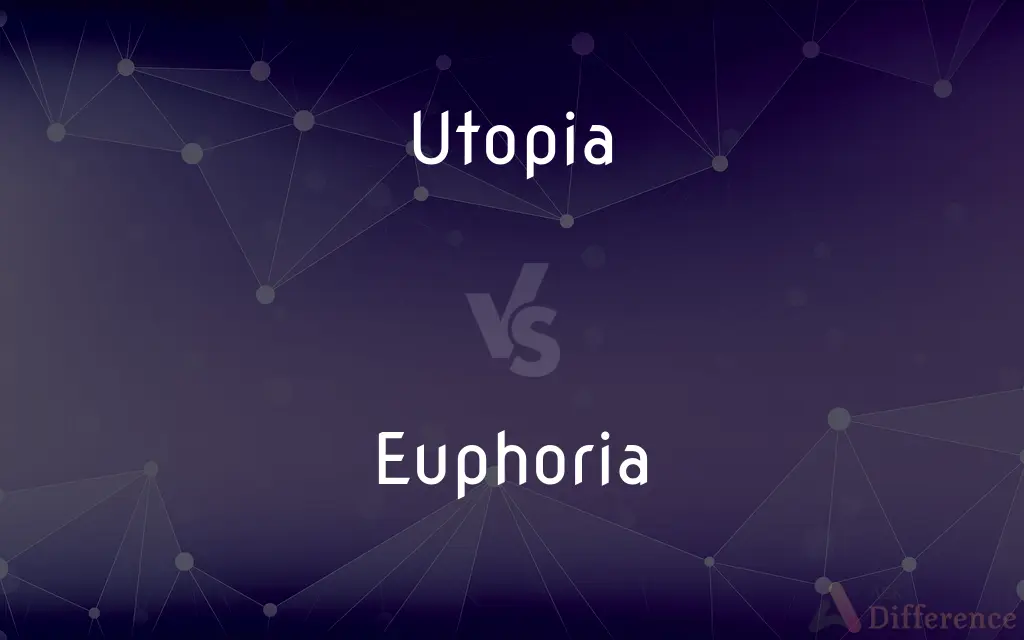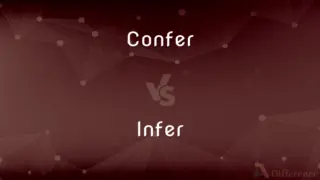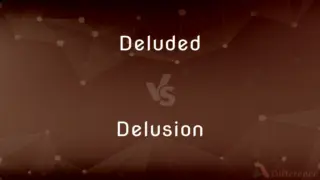Utopia vs. Euphoria — What's the Difference?
Edited by Tayyaba Rehman — By Urooj Arif — Updated on April 4, 2024
Utopia describes an idealized society or community, whereas euphoria denotes a state of intense happiness or well-being.

Difference Between Utopia and Euphoria
Table of Contents
ADVERTISEMENT
Key Differences
Utopia represents an ideal or perfect state of society, where laws, government, and social conditions are perfect and there is harmony among its inhabitants. Euphoria, on the other hand, is an intense state of happiness or well-being experienced by an individual. This feeling can arise from various sources, such as achievements, personal fulfillment, or the influence of substances.
The concept utopia often serves as a benchmark for critiquing existing societies, highlighting their flaws and the areas in need of improvement. Unlike the societal focus of utopia, euphoria is deeply personal and transient, reflecting momentary peaks in an individual's emotional state.
While utopia embodies a collective societal dream, reaching it is often deemed impossible due to the complexities and inherent imperfections of human nature and social structures. The pursuit of euphoria can sometimes lead to actions or decisions aimed at recreating or sustaining these feelings, not always aligning with societal norms or expectations.
Comparison Chart
Definition
An imagined place or state where everything is perfect
An intense feeling of happiness or well-being
Focus
Societal
Individual
ADVERTISEMENT
Duration
Theoretically everlasting
Temporary
Achievability
Often considered unachievable
Achievable but fleeting
Source of Concept
Philosophical and societal discussions
Personal experience and psychological state
Compare with Definitions
Utopia
Idealized perfection in social conditions.
The book depicts a utopia where hunger and poverty don't exist.
Euphoria
Well-being feeling from achievements.
His promotion at work brought him a sense of euphoria.
Utopia
An imagined perfect society.
She described her vision of a utopia where everyone lived in harmony.
Euphoria
A state of intense happiness.
Winning the championship filled the team with euphoria.
Utopia
A concept in political philosophy.
His lecture on utopia challenged students to think about societal ideals.
Euphoria
Temporary emotional high.
The euphoria from the concert lasted for days.
Utopia
Fictional or hypothetical perfect world.
The novel explores a utopia that collapses under its own ideals.
Euphoria
Elation from personal fulfillment.
Completing the marathon gave her an immense feeling of euphoria.
Utopia
An aspiration for a better society.
Activists often aim for what might be considered a utopia in their campaigns.
Euphoria
Psychological state of happiness.
Meditation can sometimes lead to moments of euphoria.
Utopia
A utopia ( yoo-TOH-pee-ə) is an imaginary community or society that possesses highly desirable or nearly perfect qualities for its citizens. The term was coined by Sir Thomas More for his 1516 book Utopia, describing a fictional island society in the south Atlantic Ocean off the coast of South America.
Euphoria
Euphoria ( (listen)) is the experience (or affect) of pleasure or excitement and intense feelings of well-being and happiness. Certain natural rewards and social activities, such as aerobic exercise, laughter, listening to or making music and dancing, can induce a state of euphoria.
Utopia
An imagined place or state of things in which everything is perfect
A romantic vision of Utopia
Misplaced faith in political utopias has led to ruin
Euphoria
A feeling or state of intense excitement and happiness
In his euphoria, he had become convinced he could defeat them
Utopia
Often Utopia An ideally perfect place, especially in its social, political, and moral aspects.
Euphoria
A feeling of great happiness or well-being.
Utopia
A work of fiction describing a utopia.
Euphoria
An excited state of joy; a feeling of intense happiness.
The runner was in (a state of) absolute euphoria after winning his first marathon.
Utopia
An impractical, idealistic scheme for social and political reform.
Euphoria
(LGBT) gender euphoria
Utopia
A world in which everything and everyone works in perfect harmony.
Euphoria
A strong pleasant feeling of well-being or happiness; it is often caused by attainment of a desired goal or other incident of accomplishment, but may irrationally accompany a pathological manic state.
Utopia
An imaginary island, represented by Sir Thomas More, in a work called Utopia, as enjoying the greatest perfection in politics, laws, and the like. See Utopia, in the Dictionary of Noted Names in Fiction.
Euphoria
A feeling of great (usually exaggerated) elation
Utopia
Hence, any place or state of ideal perfection.
Utopia
A book by Sir Thomas More (1516) describing the perfect society on an imaginary island
Utopia
Ideally perfect state; especially in its social and political and moral aspects
Utopia
A work of fiction describing a utopia
Utopia
An imaginary place considered to be perfect or ideal
Common Curiosities
What causes euphoria?
Euphoria can be caused by achievements, fulfillment, substances, or any event that significantly boosts happiness or well-being.
Is euphoria always a positive experience?
Euphoria is generally positive, but seeking it through harmful means or becoming dependent on certain actions for happiness can be detrimental.
How do literature and philosophy view utopia?
They often use utopia as a framework to explore ideal societies and the moral or ethical implications of striving for perfection.
Is euphoria a sign of mental health?
While euphoria can reflect moments of happiness, extreme or unexplained euphoria may need psychological evaluation.
What is utopia?
Utopia is an imagined place or society where everything is perfect, reflecting ideals in law, politics, and living conditions.
How do utopia and euphoria differ in focus?
Utopia focuses on an ideal societal state, while euphoria is about an individual's intense happiness.
Can a society achieve euphoria?
A society can create conditions for happiness, but euphoria is individual and subjective, making universal experience unlikely.
Why is euphoria considered fleeting?
Because it is an intense emotional state that peaks and then diminishes, often depending on external factors or achievements.
Can utopia exist in reality?
While utopia serves as an ideal, its actual realization is debated as inherently flawed human nature makes perfect societal conditions challenging to achieve.
Can technology create a utopian society?
Technology can improve living conditions, but a utopian society also requires ethical, political, and social harmony, which technology alone cannot ensure.
Is it possible to feel euphoria in a utopian society?
Theoretically, living in a utopian society might induce euphoria, but both concepts remain largely idealized and subjective.
How do personal values influence perceptions of utopia?
Personal values greatly influence what one considers a "perfect" society, leading to varied interpretations of utopia.
Can the pursuit of euphoria lead to negative outcomes?
Yes, if the pursuit involves harmful substances or behaviors, it can lead to negative physical, psychological, or societal effects.
Can the concept of utopia change over time?
Yes, societal values and conditions evolve, so what is considered a utopian ideal may shift with changing cultural and ethical standards.
What role does utopia play in societal development?
It serves as a goal or vision for improvement, encouraging critical thinking about current societal flaws and potential reforms.
Share Your Discovery

Previous Comparison
Confer vs. Infer
Next Comparison
Deluded vs. DelusionAuthor Spotlight
Written by
Urooj ArifUrooj is a skilled content writer at Ask Difference, known for her exceptional ability to simplify complex topics into engaging and informative content. With a passion for research and a flair for clear, concise writing, she consistently delivers articles that resonate with our diverse audience.
Edited by
Tayyaba RehmanTayyaba Rehman is a distinguished writer, currently serving as a primary contributor to askdifference.com. As a researcher in semantics and etymology, Tayyaba's passion for the complexity of languages and their distinctions has found a perfect home on the platform. Tayyaba delves into the intricacies of language, distinguishing between commonly confused words and phrases, thereby providing clarity for readers worldwide.
















































